Written by Prof Helen Thornham
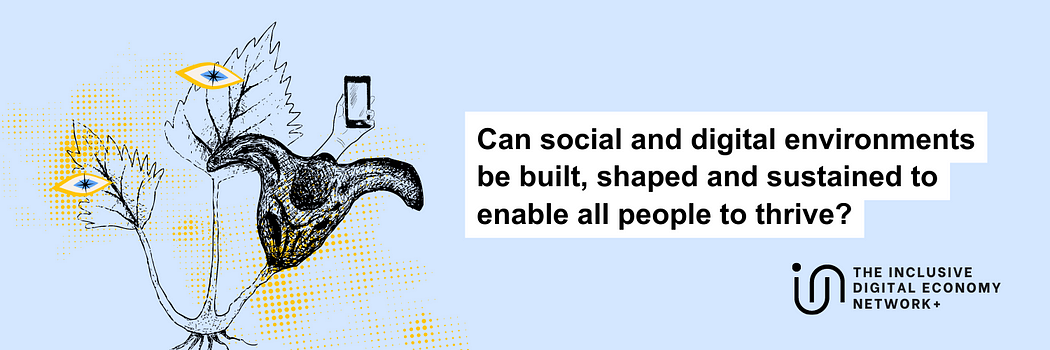
INCLUDE+ network explores how social and digital environments can be built, shaped and sustained to enable all people to thrive.
But what does it mean to ‘thrive’ in this context?
Over the past 6 months, we have been exploring the idea of ‘thriving’ through conversations with Prof. Caroline Bassett and Dr. Edgar Gómez Cruz at the Data School, Cambridge University; through our digital equity and inclusion workshops with Thrive by Design, and through related community work with Space 2 in order to think about what we mean by ‘thriving’, what properties thriving has for us, and how — ultimately — we might build for it.

When we started INCLUDE+ we understood thriving as something akin to ‘flourishing’ and we wrote it as an aim of the network because we were interested in INCLUDE+ pushing not just for being seen or being counted within social and digital environments, but being happy and successful within and through them. But the more we thought about flourishing, the more we realised that flourishing is measured in relation to the context in which it happens (those social and digital environments): you flourish within a context, and the flourishing is enabled because of that context.
But thriving seemed different to us: thriving seemed to us to be more about how we actively relate to social and digital environments and what that enables (or doesn’t), and less about what those social and digital environments enabled (or didn’t).
The difference is subtle but important because if we only think about what is enabled (our understanding of flourishing) we never have to look at what works and why: we are happy with people having the potential to thrive, rather than asking whether they are actually thriving and why (or why not).
Since launching INCLUDE+, and coming properly out of lockdown, we have also been reading around related themes such as technologies of care (Chatzidakis et al 2022, Puig de la Bellacasa’s work 2017, longstanding feminist scholarship (such as Hill Collins 1986, Fisher & Tronto 1990, Tronto 2010). The question being asked within this scholarship relates to whether care is possible within social and digital environments that are becoming more extractive and data driven.
The argument goes something like this: the conditions of and for care are generated within and through social and digital environments because these environments enable, frame and shape care (what it looks like, how it can happen, where it happens, see for example (Benjamin 2019, Lindén & Lydhal 2021, D’Ignacio & Klein 2020, Chatzidakis et al 2022).
But if care is generated within and through social and digital environments, the next question is: to what extent are extractive data policies and neoliberal politics of those environments actually reshaping care to fit those policies and politics (see for examples Táiwò 2022, Clough 2015)? Wendy Chun takes this one step further when she asks for example, whether we care more for those extractive data policies and neoliberal politics than for care ‘itself’ (2021)?
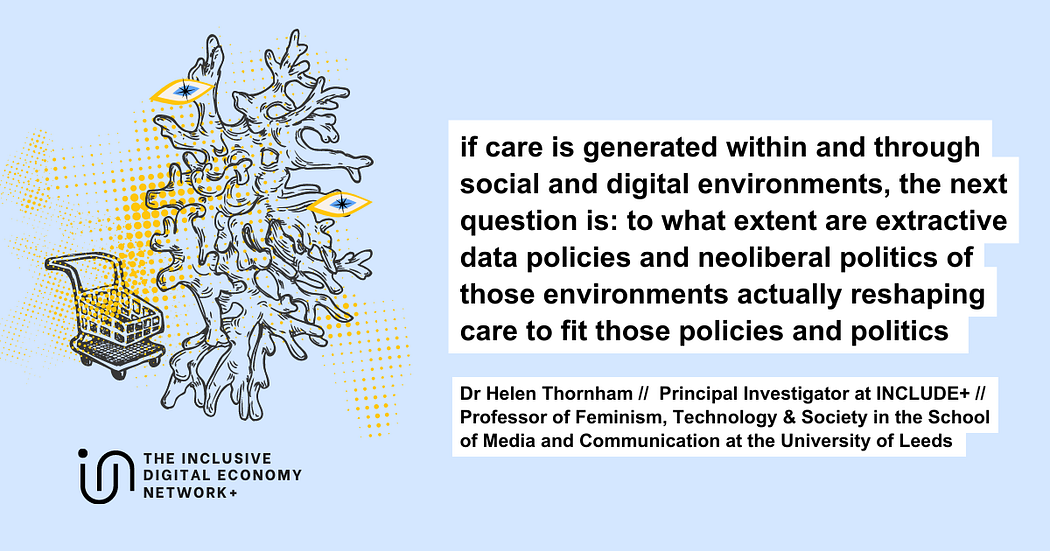
Both thriving and caring are about an investment in something (systems, people, environments) that manifests as active sustained involvement. This active sustained involvement is not uncritical or unresistant, but it constantly negotiates ways to live and work within those systems, people, environments in order to succeed.
What ‘success’ is, depends of course on those who are actively invested: success isn’t a metric we can count or even a predetermined output and what success is (as our conversations with project partners Leeds City Council reminded us) will change over a lifetime, depending on circumstances, contexts and intention. In order to care or thrive, you have to engage in active negotiation within and through (that is also critical of, and resistant to) social and digital environments: you can’t opt out but neither do you uncritically partake. It is this idea of active sustained involvement (to which we might add another word: critical) that forms the connective thread through other work that has informed how we are thinking of thriving, which we now briefly detail.
In a separate project, led by Dr. Joanne Armitage at the University of Leeds, and funded through Research England Funding, we have been working with project partners to the INCLUDE+, Space 2, their communities and a range of digital artists to try and think about automation.
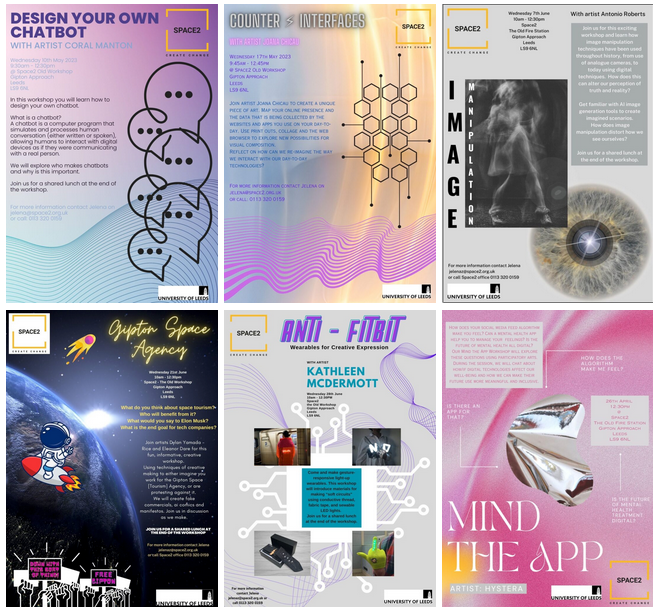
We have been considering what Prof. Bassett (drawing on Hannah Arendt) would call ‘liveliness’ — acts of creativity which emerge through negotiations between people, contexts, resources, and structures. Elsewhere, in a workshop series led by Thrive by Design with community organizations such as the Mhor Collective, Then Try This, Citadel, and Space 2 we have been asking what happens to digital inclusion agendas, demands or requirements when we insist that inclusion is also a form of liveliness — of action — of thinking. Inclusion then becomes a form of active engagement and negotiation as they are set by communities and generated through their practices (whether those are collective, activist, creative and so on).
What we have found through these workshops — which is no surprise to anyone doing community work — is that creative practices afford space to active thinking; that the communities we work with are also always already critical users of technology and always negotiate terms of use, times of use, length of engagement (to name a few). We have also found playful and innovative uses of automation in order to engage with wider provocations set by workshop facilitators. In short, we have found civic participation: active investment in the structures and processes we are working and living.
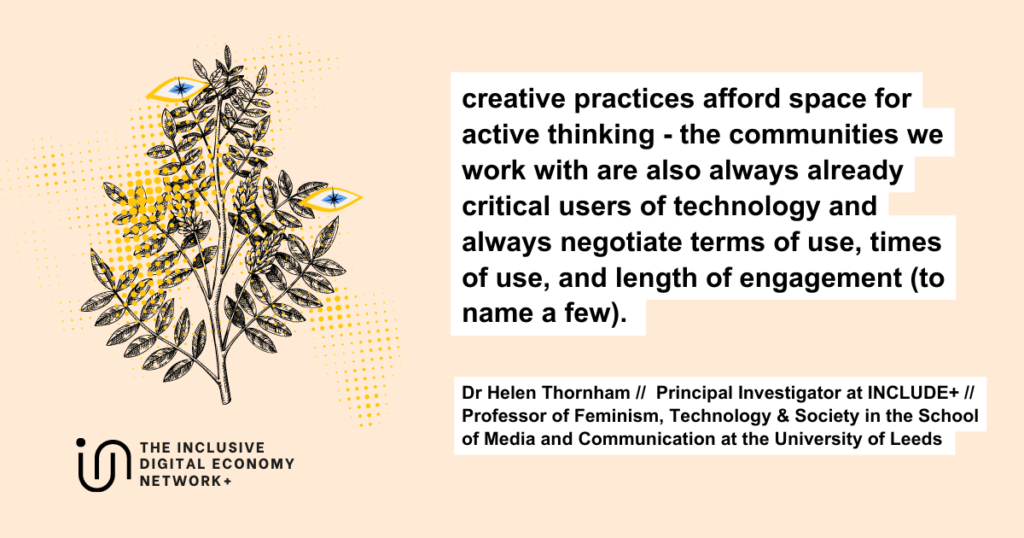
Thriving is possible then, if social and digital environments enable thinking, and if we can think and do together. Thriving is possible where we recognise expertise and agency of collectives or communities as the products of those conditions of their togetherness.
Thriving is always already negotiated, so to come back to the question of what it would mean to thrive: if we are to think about how to better do digital inclusion work, we need to think critically about social and digital environments and how we can generate collective sustained (critical) action within them. For INCLUDE+ then, and moving forward, our understanding of thriving is …
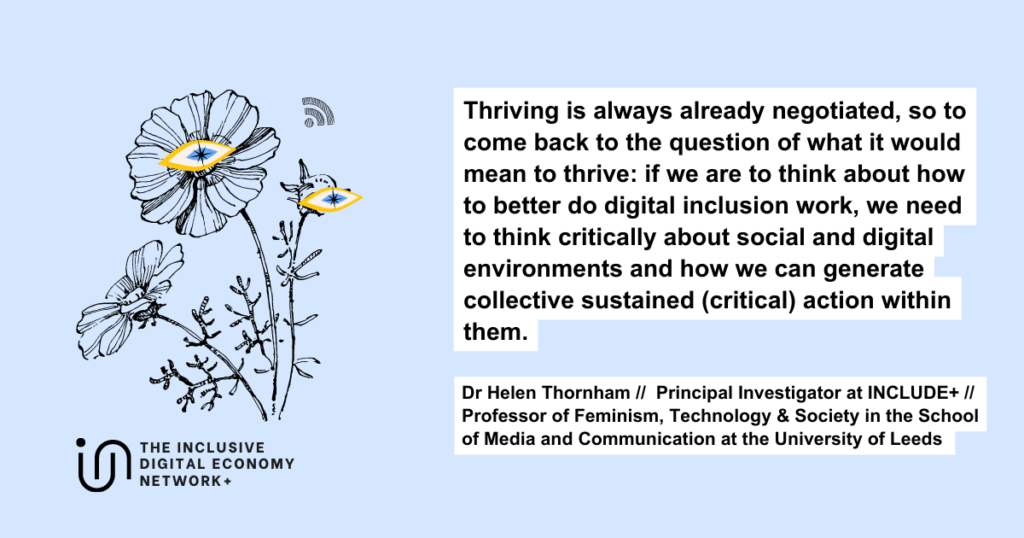
- tied to, generated by, implicated within other structures, whether they are bureaucratic, algorithmic, data-driven, discursive, or social. This means that when we seek to enable all people to thrive, we also need to change the structures and processes they can thrive in and through
- an outcome of semi-automated or automated decision making. Thriving can be structurally built although this in no way guarantees thriving.
- a condition of decision making systems and processes. This means we need to also build structures and processes that fit the values associated with thriving.
- tied to power which in turn generates those socio-technical systems and processes through unseen bias, normative assumptions, gaps and prejudice. This means that we constantly have to ask who might not be thriving or able to thrive and seek to redress this.
- collective, sustained and active interaction with social and digital environments. Thriving rarely happens on its own. Instead, it is enabled through collective and community practice over time. We need to stop measuring thriving as an individual or isolated event, and build new markers to recognise it as collective and sustained.
Author: Professor Helen Thornam — principal Investigator at INCLUDE + Network & Professor of Feminism, Technology and Society, University of Leeds.
Edgar Gómez Cruz is an Associate Dean at the School of Information, University of Texas, Austin
Caroline Bassett is a Professor of Digital Humanities, University of Cambridge
Joanne Armitage is a Lecturer of Digital Media at the University of Leeds and a visiting scholar at Berkman Klein Centre, Harvard
References
Amrute, S., Singh, R., & Guzmán, R. L. (2022). A Primer on AI in/from the Majority World: An Empirical Site and a Standpoint. Available at SSRN 4199467.
Arendt, H (1958) The Human Condition. Chicago. University of Chicago Press
Arendt, H (2018) Thinking without a Bannister: Essays in Understanding 1953–75. New York: Schocken Books
Benjamin, R 2018. Race After Technology. London. Polity Burrows, R. (2012) ‘Living with the H-Index. Metric Assemblages in the Contemporary Academy’, The Sociological Review, 60(2), pp. 355–372.
Chatzidakis, A.; Hakim, J.; Littler, J.; Rottenberg, C.; Segal, L: The Care Collective (2020) The Care Manifesto: The Politics of Interdependence. London: Verso.
Chun, W. H. K.( (2021) ‘The Space between Us: Network Gaps, Racism, and the Possibilities of Living in/Difference’, ” Catalyst: Feminism, Theory, Technoscience, 7(2), pp. 1–25.
Clough, P; Gregory, K; Haber, B; Scannell, R. J. (2015) ‘The Datalogical Turn’, in Non-Representational Methodologies. London: Routledge, pp. 146–165.
D’Ignazio, C. and Klein, L. F (2020) Data Feminism. Cambridge MA. MIT Press.
Esposito, R (2022) Institution. London: Polity (trans. Zakiya Hanafi)
Eubanks, V. (2017) Automating Inequality: How High-Tech Tools Profile, Police and Punish the Poor. New York: St. Martin’s Press Holmwood, J. (2010) ‘Sociology’s misfortune: Disciplines, Interdisciplinarity and the Impact of Audit Culture’, British Journal of Sociology, 61(4), pp. 639–658.
Fisher, B., & Tronto, J. (1990) ‘Towards a Feminist Theory of Caring’, in Circles of Care: Work and Identity in Women’s Lives. Albany: State University of New York Press, pp. 35–62.
Hill Collins, P.(1986) ‘Learning from the Outsider Within: The Sociological Significance of Black Feminist Thought’, Social Problems, 33(6), pp. S14–S32.
Lindén, L. & Lydahl, D. (2021) ‘Care in STS’, Nordic Journal of Science and Technology Studies, 9(1), pp. 3–12.
Puig de la Bellacasa, M. (2017) Matters of Care: Speculative Ethics in More Than Human Worlds. Minneapolis: University of Minnesota Press.
Rosa, F. R. (2022). From community networks to shared networks: The paths of Latin-Centric Indigenous networks to a pluriversal internet. Information, Communication & Society, 1–19.
Tronto, J. (2010) ‘Creating Caring Institutions: Politics, Plurality, and Purpose’, Ethics and Social Welfare, 4(2).
